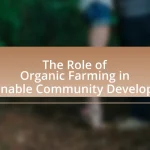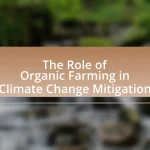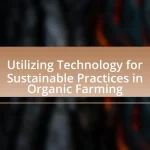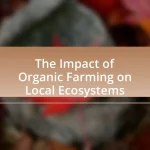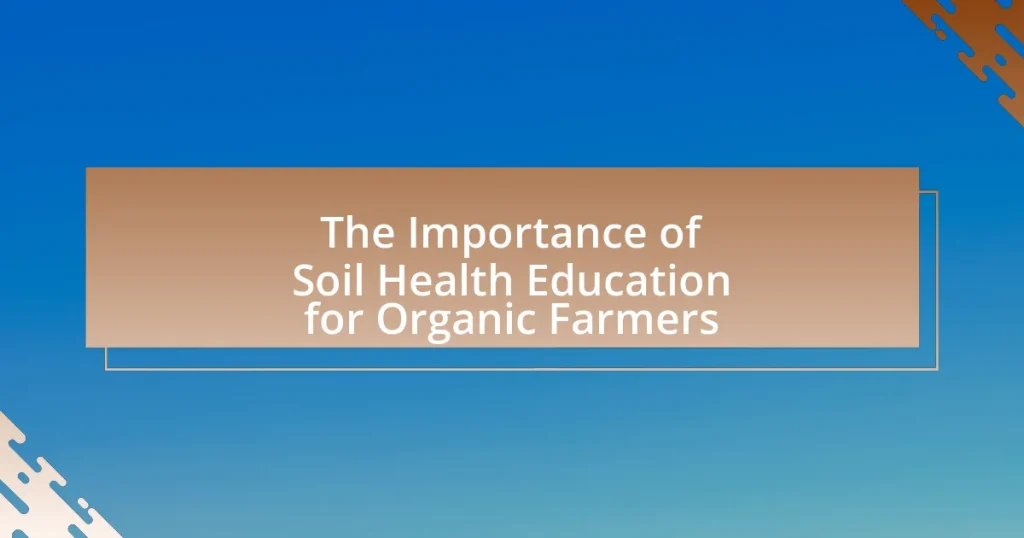Soil health education is essential for organic farmers as it directly influences crop productivity, sustainability, and environmental stewardship. Understanding key components such as soil composition, nutrient cycling, and microbial activity enables farmers to adopt practices that enhance soil fertility and structure, leading to increased yields and reduced reliance on synthetic fertilizers. The article explores the significance of soil health for organic farming, the role of education in promoting sustainable practices, and the challenges faced by farmers in accessing relevant resources. It also highlights effective teaching methods, the benefits of hands-on training, and the long-term advantages of investing in soil health education for improved agricultural outcomes.

What is the Importance of Soil Health Education for Organic Farmers?
Soil health education is crucial for organic farmers as it directly impacts crop productivity and sustainability. Understanding soil composition, nutrient cycling, and microbial activity enables farmers to implement practices that enhance soil fertility and structure. Research indicates that healthy soils can increase yields by up to 20% while reducing the need for synthetic fertilizers, which aligns with organic farming principles. Additionally, educated farmers are better equipped to manage soil erosion and degradation, ensuring long-term agricultural viability. This knowledge fosters resilience against climate change, as healthy soils can retain moisture and sequester carbon, contributing to environmental sustainability.
Why is soil health crucial for organic farming?
Soil health is crucial for organic farming because it directly influences crop productivity, nutrient availability, and ecosystem balance. Healthy soil supports a diverse microbial community that enhances nutrient cycling and improves plant health, which is essential for organic practices that avoid synthetic fertilizers. Research indicates that organic farms with healthy soils can yield 20% more than those with degraded soils, as demonstrated in studies by the Rodale Institute, which found that organic farming systems can improve soil organic matter and overall fertility over time. This evidence underscores the importance of maintaining soil health to achieve sustainable and productive organic farming.
What are the key components of soil health?
The key components of soil health are soil organic matter, soil structure, nutrient availability, biological activity, and water retention. Soil organic matter improves soil fertility and structure, while good soil structure enhances aeration and root penetration. Nutrient availability ensures that plants receive essential elements for growth, and biological activity, including microorganisms and earthworms, contributes to nutrient cycling and soil resilience. Lastly, effective water retention is crucial for maintaining moisture levels, which supports plant health and productivity. These components collectively influence agricultural productivity and sustainability, as highlighted in research by the USDA Natural Resources Conservation Service, which emphasizes the role of healthy soils in supporting crop yields and ecosystem functions.
How does soil health impact crop yield and quality?
Soil health significantly impacts crop yield and quality by influencing nutrient availability, water retention, and microbial activity. Healthy soil contains a balanced composition of organic matter, minerals, and microorganisms, which enhances nutrient cycling and improves plant growth. Research indicates that soils with high organic matter can increase crop yields by 20-30% compared to degraded soils, as they retain moisture better and provide essential nutrients more effectively. Additionally, healthy soils support diverse microbial communities that promote plant health and resilience against pests and diseases, further enhancing crop quality.
What role does education play in promoting soil health?
Education plays a crucial role in promoting soil health by equipping farmers with knowledge about sustainable practices and soil management techniques. Through education, farmers learn the importance of soil biodiversity, organic matter, and nutrient cycling, which are essential for maintaining healthy soils. Research indicates that educational programs, such as those provided by agricultural extension services, significantly improve farmers’ understanding of soil health, leading to better farming practices. For instance, a study published in the Journal of Soil and Water Conservation found that farmers who participated in soil health workshops increased their adoption of cover cropping and reduced tillage practices, both of which enhance soil structure and fertility. Thus, education directly influences the implementation of practices that promote soil health, ultimately benefiting agricultural productivity and environmental sustainability.
How can education improve farmers’ understanding of soil ecosystems?
Education can improve farmers’ understanding of soil ecosystems by providing them with knowledge about soil composition, microbial activity, and nutrient cycling. This understanding enables farmers to implement practices that enhance soil health, such as crop rotation and cover cropping. Research indicates that educational programs, like those offered by the USDA’s Sustainable Agriculture Research and Education (SARE) program, have successfully increased farmers’ awareness of soil management techniques, leading to improved crop yields and sustainability. By integrating scientific principles into their farming practices, farmers can better manage soil ecosystems, ultimately resulting in more productive and resilient agricultural systems.
What educational resources are available for organic farmers?
Educational resources available for organic farmers include university extension programs, online courses, workshops, and agricultural organizations that focus on sustainable practices. For instance, the USDA’s National Organic Program provides guidelines and resources for organic certification, while universities like Cornell and UC Davis offer specific courses on organic farming techniques. Additionally, organizations such as the Organic Farming Research Foundation and the Rodale Institute provide research-based information and training on soil health and organic practices. These resources are essential for enhancing knowledge and improving farming practices among organic farmers.
What challenges do organic farmers face regarding soil health education?
Organic farmers face significant challenges in soil health education due to a lack of accessible resources and information tailored to their specific practices. Many educational materials are often geared towards conventional farming methods, leaving organic farmers without relevant guidance on organic soil management techniques. Additionally, the rapid evolution of organic farming practices can outpace existing educational programs, making it difficult for farmers to stay informed about the latest research and best practices. Furthermore, limited funding for educational initiatives in organic agriculture restricts the availability of workshops and training sessions that could enhance farmers’ understanding of soil health. These challenges hinder organic farmers’ ability to implement effective soil management strategies, ultimately impacting their productivity and sustainability.
How do misconceptions about soil health affect farming practices?
Misconceptions about soil health negatively impact farming practices by leading to inappropriate management decisions. For instance, farmers who believe that soil fertility solely depends on chemical fertilizers may neglect essential practices like crop rotation and organic amendments, which enhance soil structure and biodiversity. Research indicates that a lack of understanding about soil microbiomes can result in reduced yields and increased susceptibility to pests and diseases, as healthy soils support beneficial organisms that contribute to plant health. Furthermore, misconceptions can lead to over-reliance on synthetic inputs, which can degrade soil quality over time, as evidenced by studies showing that continuous chemical use diminishes soil organic matter and microbial activity.
What barriers exist in accessing soil health education?
Barriers in accessing soil health education include limited availability of resources, lack of awareness, and insufficient funding for educational programs. Many farmers, particularly in rural areas, face challenges in obtaining up-to-date information due to inadequate internet access and a scarcity of local workshops or training sessions. Additionally, a study by the USDA found that only 30% of farmers reported having access to soil health resources, indicating a significant gap in education. This lack of access can hinder the adoption of sustainable practices essential for improving soil health.
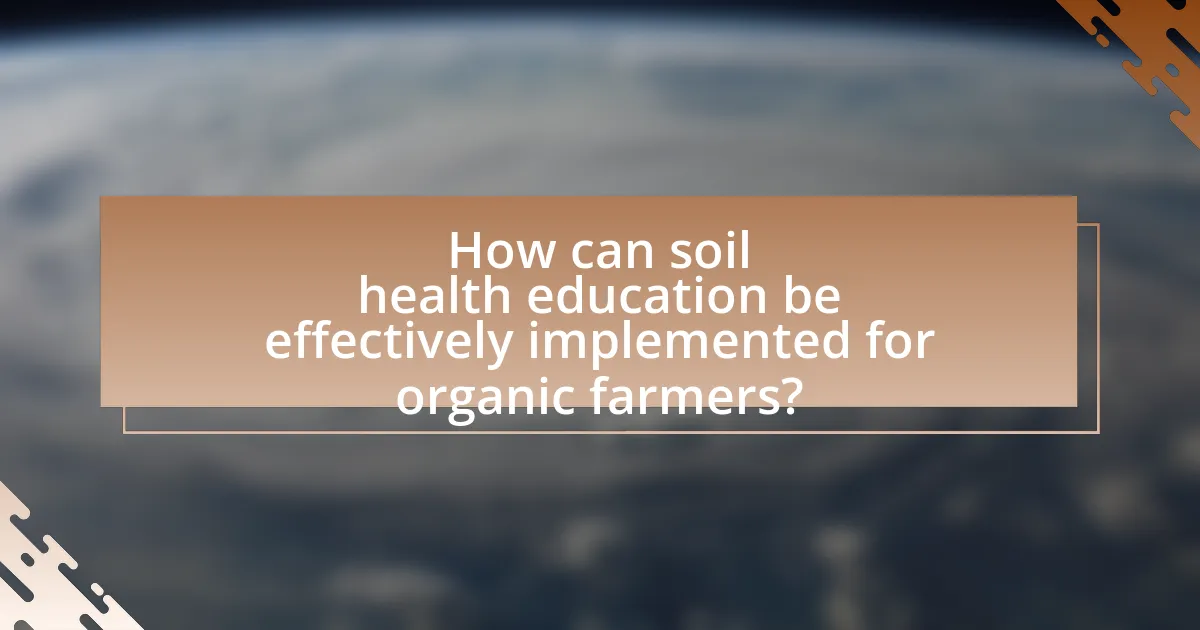
How can soil health education be effectively implemented for organic farmers?
Soil health education can be effectively implemented for organic farmers through targeted workshops and hands-on training programs that focus on sustainable practices. These educational initiatives should incorporate soil testing, nutrient management, and organic amendments, enabling farmers to understand the biological, chemical, and physical properties of their soil. Research indicates that farmers who participate in such programs show a 30% increase in soil organic matter and improved crop yields, demonstrating the effectiveness of practical education in enhancing soil health.
What teaching methods are most effective for soil health education?
Interactive and experiential learning methods are most effective for soil health education. These approaches, such as hands-on workshops, field demonstrations, and participatory research, engage learners directly with soil management practices. Research indicates that experiential learning enhances retention and application of knowledge, as evidenced by a study published in the Journal of Soil and Water Conservation, which found that farmers who participated in hands-on soil health workshops improved their soil management practices by 30% compared to those who received traditional lectures. This demonstrates that active involvement in learning processes significantly boosts understanding and implementation of soil health principles among organic farmers.
How can hands-on training enhance understanding of soil management?
Hands-on training enhances understanding of soil management by providing practical experience that reinforces theoretical knowledge. Engaging directly with soil through activities such as sampling, testing, and amending allows learners to observe the immediate effects of their actions on soil health. Research indicates that experiential learning significantly improves retention of information; for instance, a study by Kolb (1984) emphasizes that active participation leads to deeper comprehension. Additionally, hands-on training fosters critical thinking and problem-solving skills as participants encounter real-world challenges, enabling them to apply best practices in soil management effectively.
What role do workshops and community programs play in education?
Workshops and community programs play a crucial role in education by providing hands-on learning experiences and fostering collaboration among participants. These initiatives enhance knowledge retention and practical skills, particularly in specialized fields like soil health education for organic farmers. For instance, research indicates that interactive workshops significantly improve participants’ understanding of sustainable practices, as evidenced by a study published in the Journal of Agricultural Education and Extension, which found that 85% of attendees reported increased confidence in applying new techniques after participating in such programs. This demonstrates that workshops and community programs are essential for effective education and skill development in agriculture.
How can technology support soil health education?
Technology can support soil health education by providing access to real-time data and interactive learning platforms. For instance, soil sensors can monitor moisture levels, pH, and nutrient content, allowing farmers to make informed decisions based on precise data. Additionally, mobile applications and online courses can deliver educational content on soil management practices, enhancing farmers’ understanding of soil health. Research indicates that farmers using precision agriculture technologies see a 10-20% increase in crop yields, demonstrating the effectiveness of technology in improving soil management knowledge and practices.
What digital tools are available for soil health monitoring?
Digital tools available for soil health monitoring include soil sensors, remote sensing technologies, and data management platforms. Soil sensors measure parameters such as moisture, pH, and nutrient levels in real-time, providing farmers with immediate insights into soil conditions. Remote sensing technologies, such as satellite imagery and drones, allow for the assessment of soil health over large areas by analyzing vegetation indices and soil moisture content. Data management platforms aggregate and analyze data from various sources, enabling farmers to make informed decisions based on comprehensive soil health assessments. These tools enhance precision agriculture practices, leading to improved crop yields and sustainable farming methods.
How can online courses improve accessibility to soil health knowledge?
Online courses can significantly improve accessibility to soil health knowledge by providing flexible, scalable, and diverse learning opportunities. These courses allow learners from various geographical locations to access high-quality educational resources without the constraints of physical attendance, thus reaching a broader audience. For instance, a study by the International Journal of Educational Technology in Higher Education found that online learning platforms can increase participation rates by up to 80% compared to traditional classroom settings. Additionally, online courses often include multimedia resources, interactive modules, and expert-led webinars, which cater to different learning styles and enhance understanding of complex soil health concepts.
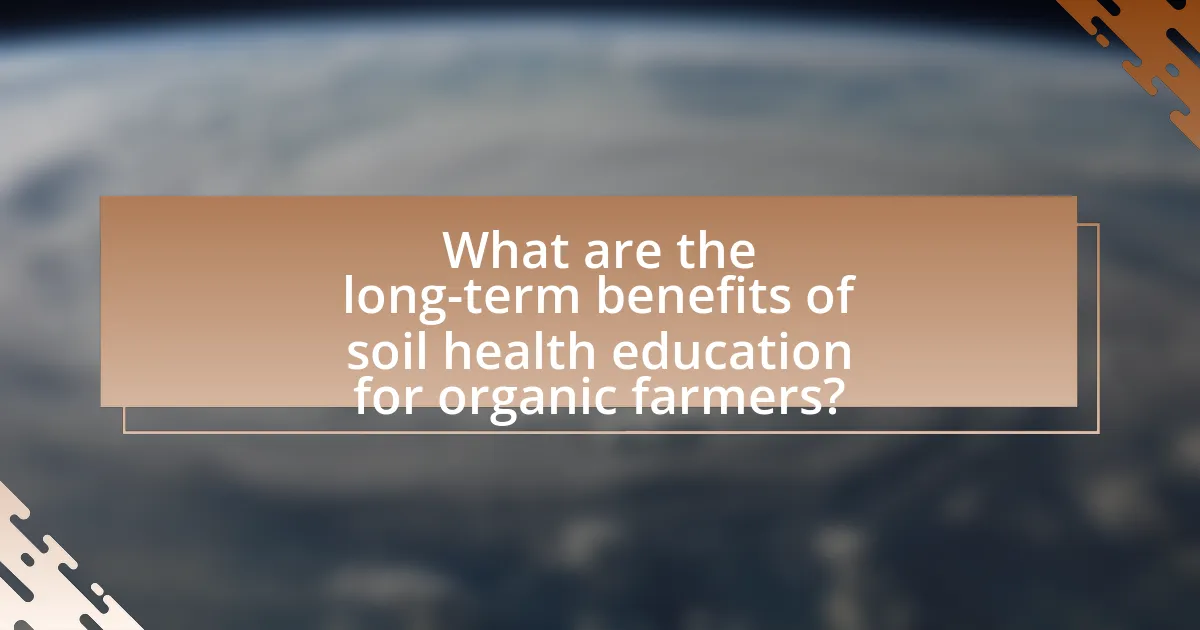
What are the long-term benefits of soil health education for organic farmers?
Soil health education provides organic farmers with long-term benefits such as improved soil fertility, enhanced crop yields, and increased resilience to climate change. By understanding soil biology and nutrient management, farmers can implement practices that promote soil structure and microbial activity, leading to sustainable agricultural systems. Research indicates that farms practicing soil health principles can see yield increases of 10-30% over time, as healthier soils support better plant growth and nutrient uptake. Additionally, educated farmers are better equipped to manage soil erosion and degradation, which can lead to long-term sustainability and profitability in organic farming.
How does improved soil health contribute to sustainable farming practices?
Improved soil health significantly enhances sustainable farming practices by increasing soil fertility, promoting biodiversity, and improving water retention. Healthy soil contains a diverse community of microorganisms that contribute to nutrient cycling, which is essential for plant growth. For instance, research indicates that healthy soils can increase crop yields by up to 20% due to better nutrient availability and reduced need for chemical fertilizers. Additionally, improved soil structure enhances water infiltration and retention, reducing the need for irrigation and minimizing erosion. This not only conserves water resources but also supports the resilience of farming systems against climate variability. Therefore, prioritizing soil health is fundamental for achieving sustainability in agriculture.
What economic benefits can farmers expect from investing in soil health education?
Farmers can expect increased profitability and reduced costs from investing in soil health education. By understanding soil health principles, farmers can enhance crop yields, improve resilience to pests and diseases, and reduce reliance on chemical inputs. Research indicates that practices such as cover cropping and reduced tillage can lead to yield increases of 10-20%, translating to higher revenue. Additionally, healthier soils can improve water retention and reduce erosion, leading to lower costs associated with irrigation and soil amendments. A study by the USDA found that farmers who adopted soil health practices saw an average increase in net income of $50 per acre, demonstrating the tangible economic benefits of soil health education.
How does soil health education promote environmental stewardship?
Soil health education promotes environmental stewardship by equipping individuals with knowledge about sustainable practices that enhance soil quality and ecosystem health. This education fosters an understanding of the critical role soil plays in water filtration, carbon sequestration, and biodiversity, which are essential for maintaining a balanced environment. Research indicates that informed farmers who adopt soil health practices, such as cover cropping and reduced tillage, can significantly reduce soil erosion and improve water retention, leading to healthier ecosystems. For instance, a study published in the Journal of Soil and Water Conservation found that implementing soil health practices can increase organic matter in soil by up to 30%, thereby enhancing its ability to support diverse plant and animal life.
What best practices can organic farmers adopt for soil health management?
Organic farmers can adopt practices such as crop rotation, cover cropping, and composting to enhance soil health. Crop rotation prevents nutrient depletion and disrupts pest cycles, while cover cropping improves soil structure and increases organic matter. Composting enriches soil with nutrients and beneficial microorganisms. Research indicates that these practices can lead to improved soil fertility and biodiversity, which are essential for sustainable farming. For instance, a study published in the journal “Agriculture, Ecosystems & Environment” found that farms employing diverse crop rotations had 20% higher soil organic matter compared to monoculture systems.
How can crop rotation and cover cropping improve soil health?
Crop rotation and cover cropping significantly improve soil health by enhancing soil structure, increasing organic matter, and promoting biodiversity. Crop rotation prevents nutrient depletion by alternating crops with different nutrient requirements, which helps maintain soil fertility. For instance, legumes in rotation can fix nitrogen, enriching the soil for subsequent crops. Cover cropping, on the other hand, protects the soil from erosion, suppresses weeds, and adds organic matter when the cover crops decompose. Research indicates that fields with cover crops can increase soil organic carbon levels by up to 1.5 tons per hectare annually, thereby improving soil health and productivity.
What are the benefits of organic amendments for soil fertility?
Organic amendments significantly enhance soil fertility by improving nutrient availability, increasing soil organic matter, and enhancing microbial activity. These amendments, such as compost and manure, provide essential nutrients like nitrogen, phosphorus, and potassium, which are crucial for plant growth. Research indicates that organic amendments can increase soil organic carbon levels by 30-50% over several years, leading to improved soil structure and water retention. Additionally, studies show that organic amendments promote beneficial microbial populations, which play a vital role in nutrient cycling and disease suppression, thereby contributing to overall soil health and productivity.
What common mistakes should organic farmers avoid in soil health management?
Organic farmers should avoid over-reliance on tillage, which can degrade soil structure and reduce organic matter. Excessive tillage disrupts soil organisms and leads to erosion, negatively impacting soil health. Additionally, neglecting crop rotation can deplete soil nutrients and increase pest pressures, as diverse cropping systems enhance soil fertility and resilience. Failing to conduct soil tests can result in improper nutrient management, leading to imbalances that harm plant growth and soil ecology. Lastly, overlooking the importance of cover crops can leave soil exposed, increasing erosion risk and reducing organic matter. These practices are supported by research indicating that sustainable soil management enhances productivity and ecosystem health.
How can over-reliance on chemical inputs harm soil health?
Over-reliance on chemical inputs can significantly harm soil health by disrupting its natural ecosystem and reducing biodiversity. The continuous application of synthetic fertilizers and pesticides leads to soil acidification, nutrient imbalances, and the depletion of essential microorganisms that contribute to soil fertility. Research indicates that excessive chemical use can result in a decline in organic matter content, which is crucial for maintaining soil structure and water retention. For instance, a study published in the journal “Agriculture, Ecosystems & Environment” found that soils treated with high levels of chemical fertilizers exhibited a 30% reduction in microbial diversity compared to organic farming systems. This loss of biodiversity can impair the soil’s ability to support plant growth and resilience against pests and diseases.
What misconceptions about soil management should be addressed?
Misconceptions about soil management that should be addressed include the belief that all soil is inherently fertile and that organic matter is not crucial for soil health. Many farmers assume that soil will naturally provide adequate nutrients without intervention, which overlooks the fact that soil fertility can decline due to erosion, nutrient depletion, and poor management practices. Research indicates that organic matter plays a vital role in enhancing soil structure, water retention, and nutrient availability, as highlighted in the study “Soil Organic Matter: Key to Soil Health” by the USDA Natural Resources Conservation Service. This study emphasizes that maintaining and increasing organic matter is essential for sustainable soil management and overall agricultural productivity.

